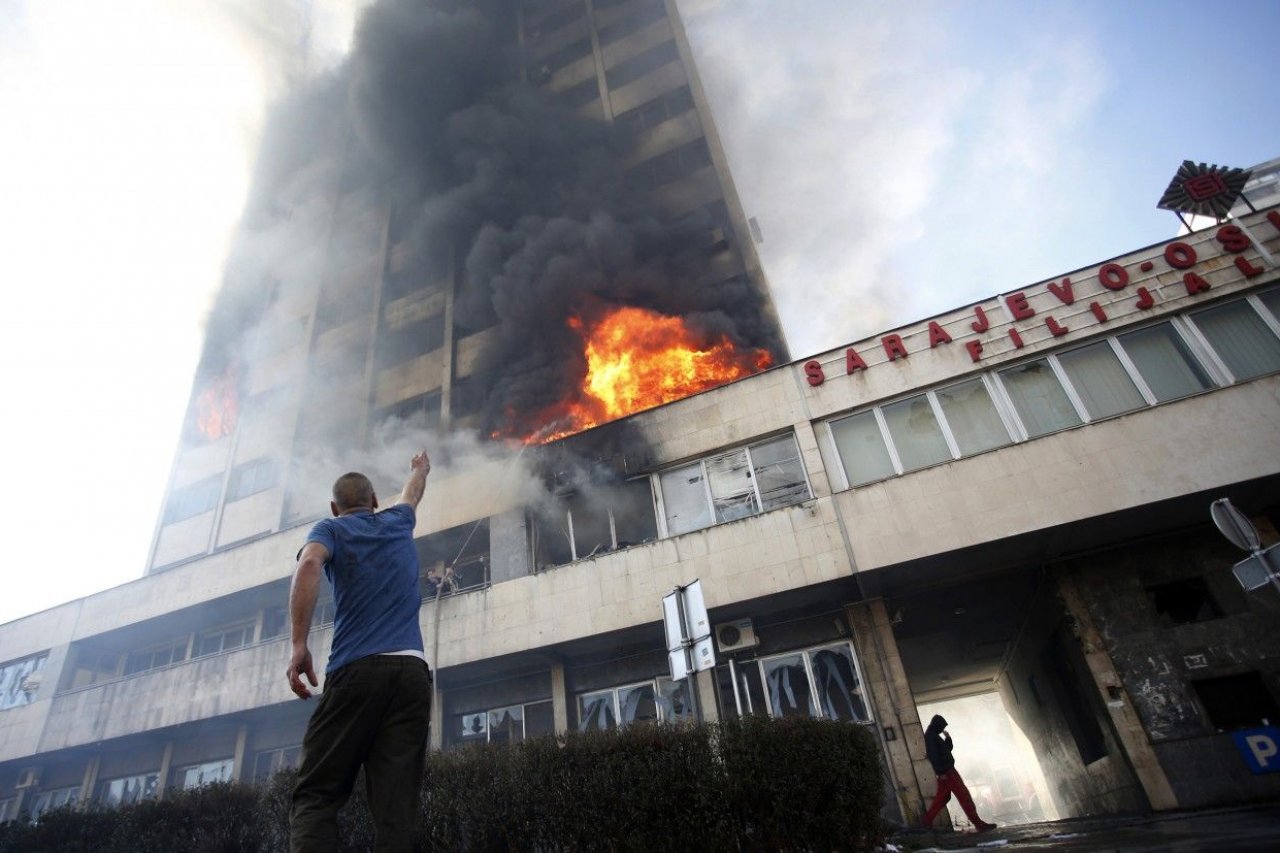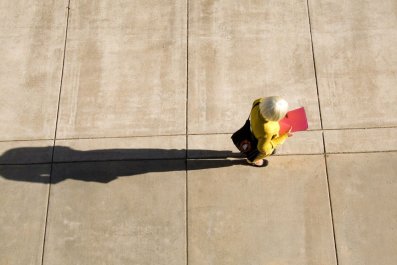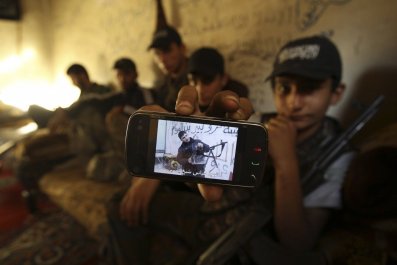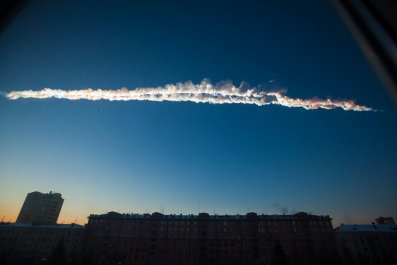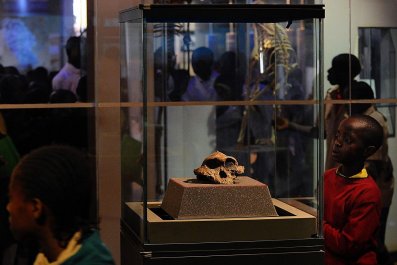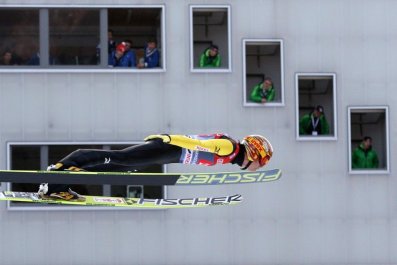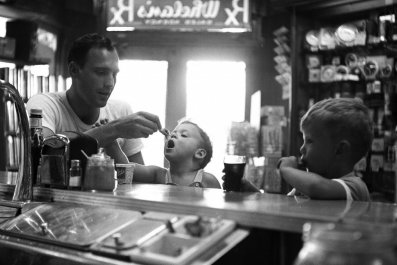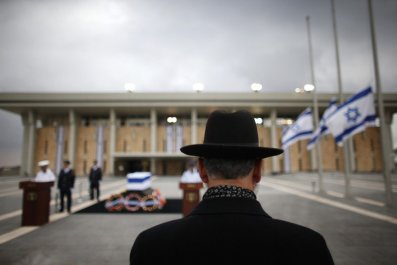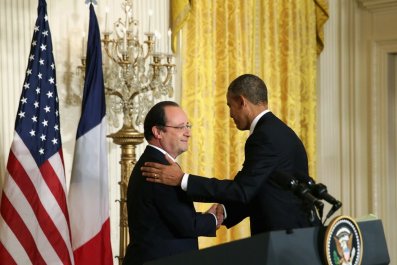Last week, violence and unrest once again returned to Bosnia. What started as a popular protest against corruption, mismanagement and poverty led the country's security minister to warn of a "citizen tsunami."
They were the most widespread antigovernment protests since the war ended 18 years ago.
Sarajevo, which had become the symbol of suffering during its three-year siege from 1992 to 1995, was shut down, as well as five other cities.
There were fires at the presidency building, where 20 years ago the embattled Bosnian leaders led their government from behind sandbags and blast walls - without heat and often without electricity in their offices.
Aggrieved students - some not even born during the war - threw rocks at policemen. Those who had lived during the days of deprivation, murder and ethnic cleansing in the 1990s watched in horror.
Velma Saric, a journalist and activist, stood by the presidency building, silently watching the flames.
"I was mute with shock. I just remembered the dark days of the war. I was genuinely scared that such dark days might be coming again," he said.
It was terrifying, Saric added, to watch how helpless the police were "in the face of the violence roaring through the streets."
Ziyah Gafic, a photojournalist, added: "Police in Sarajevo was severely undermanned and extremely passive.
"There were no armored cars, no water cannons and very few tear-gas canisters were used - although there are at least two branches of security forces fully trained and equipped for riot control."
What triggered the riots? Most Bosniaks asked were adamant: unemployment, low wages, poverty, corruption.
"There are so many valid reasons to protest in Bosnia," Gafic said. "Nontransparent and criminal privatization of state-owned companies, widespread corruption, nepotism and general misery - to name just a few."
Ordinary people are infuriated with Bosnian federation officials they feel are corrupt and overpaid. The signs protesters carried - "You have been stealing from us for 20 years" - were self-explanatory.
Some called for the resignation of the government in Bosnia's federation, one of two autonomous republics, which is composed mainly of Croats and Muslim Bosniaks.
"After 18 years it is not surprising people are fed up," said Tim Judah, author of The Serbs and a longtime Balkan analyst. "Living standards go down while politicians seem to get richer and drive ever-fancier cars. You need to bribe to get a good job, and nationalist politics have meant that economics is always sidelined."
Life in post-war in Bosnia has not been easy. While the shelling that murdered children and ripped through marketplaces where people went to buy meager supplies is gone and the stink of burnt out villages in central Bosnia has past, there is poverty, a lack of any kind of hopeful future, and lingering sectarian unease.
But this recent violence is not about ethnic conflict; it is about frustration. Prices are high and the average worker can barely "make ends meet," said Saric.
Angered by alleged corruption, economic insecurity and the fact that the elected leaders in the country of 3.8 million seem blithely unaware of the needs of their people, people of Bosnia erupted.
The protests started on February 6, when a group of chemical workers in the northern city of Tuzla, disgruntled at not receiving their salaries for the last 18 months, gathered in front of a government building.
Shortly, the situation turned to violence, spreading to Sarajevo and other cities, where people also came out on the streets.
"It's a fact that in former Yugoslavia, Tuzla used to have one of the most developed industries. But it was destroyed after the war, through bad privatization and the corruptness of political parties," said Saric. "These workers have been warning the government about their issues for a long time, but no one was paying attention."
Together the complaints all add up to the classic ingredients of a revolution - which for many, like Saric - is a terrifying thought.
As she watched the events unfold in Sarajevo starting on February 7 and witnessed the apoplectic faces of people hurling rocks at police, she grew increasingly alarmed. The flaming buildings, the angry crowds, the fear and insecurity brought back terrible moments.
"When protesters started moving toward the presidency building, I went home," Saric said. "I just couldn't stand seeing that building attacked and burned, because for me it is a symbol of statehood and resistance in besieged Sarajevo."
The war in Bosnia technically ended in 1995 with the Dayton Peace Accords, brokered by American diplomat Richard Holbrooke on a military base in Ohio, but in many ways the war did not end there.
It is true that front lines were frozen then, and the bloody fighting between Bosnian Muslim, Croat and Serb fighters was halted. But the tensions and the ethnic disintegration continued. The former Communist Yugoslavia, which had existed under the Tito-esque promotion of brotherhood and unity of six nations, was no more.
"I had come to Yugoslavia to see what history meant in flesh and blood," the British author Rebecca West wrote in 1941 in her quintessential book on the former Yugoslavia, Black Lamb and Grey Falcon. West had travelled throughout the country on the eve of World War II.
The past has always haunted Bosnia. On June 28, 1914, Archduke Franz Ferdinand of Austria, heir presumptive to the Austro-Hungarian throne, and his wife, Sophie, duchess of Hohenberg, were shot dead in Sarajevo, by Gavrilo Princip.
Princip was a young Serbian activist, part of a group of six assassins (five Serbs and one Bosnian Muslim). Their aim: to break off Austria-Hungary's south-Slav provinces so they could be combined into a Greater Serbia or a Yugoslavia. The assassination directly sparked the events that led to World War I.
World War II was fought brutally in the country, and during the war in the early 1990s, people often talked of how various ethnics groups had murdered their parents or relatives.
West captured the essence of the cycle of hatred and violence: "Were I to go down into the marketplace...and take a peasant by the shoulders and whisper to him, 'In your lifetime, have you known peace?' ... I would never hear the word 'Yes,' if I carried my questioning of the dead back for a thousand years. I would always hear, 'No, there was fear, there were our enemies without, our rulers within, there was prison, there was torture, there was violent death."
The war in Bosnia left deep scars and in many ways a collective trauma that was always going to be difficult to heal. Holbrooke knew this when he negotiated Dayton: He always saw it as being little more than a temporary end to alleviate the suffering.
Post-war Bosnia was a grim reminder of the failure of the international community to act. While funds poured into the destroyed country for rebuilding, there was an emergence of religious divides that had not, in some ways, existed before the war. And so much money pouring in for reconstruction naturally attracted criminal elements.
The country changed drastically. Mosques were built rapidly in Sarajevo with overseas funds. In some places schoolchildren were taught in several languages - Bosniak and Serbian - under one roof. Santa Claus was banned one year in a Sarajevo school, causing secular Muslim parents who had celebrated the holiday along with their own holiday to protest.
The country was as a crossroads for drug and human trafficking. And there was fearful talk from Europe about the possibility of Bosnia becoming a failed state, like Somalia, attracting jihadists.
"These waves of social protests that have shook Bosnia have roots in the huge unemployment - but response by authorities show that the real problem is a corrupted and inefficient state," said Srdja Popovic, an analyst in Belgrade who helped topple the Serbian dictator Slobodan Milosevic as a young student in 2000. "They are incapable of handling social problems"
And what will happen in the next weeks and months? Saric believes people will continue to protest until the staggering unemployment rate is addressed. There is also the question of the resentful youth who face a future without work.
Popovic, who believes that dictators and politicians not serving the needs of the people should be removed by nonviolent means, fears the protests have the potential to grow into something far more dangerous.
"But up to now, Bosnian protests haven't been too organized," he said. "It still looks like a bunch of independent angry groups."
In a balanced view, he said, this wave of protests may be a profound test for unhappy Bosnians: whether they can direct their anger into clear demands and a clear vision of future that would result in true democratic processes being set up.
"Foreigners, including European Union officials, should show restraint and not make things worse. What they can do is help Bosnians mature into their own democratic future," he said.
Whether the protests over similar issues erupting in Kosovo and Serbia in the past week will turn into a Bosnian or Balkan Spring is too early to say, said Judah.
"What is sure is that Bosnia's problems are not unique," he said. "What is new are the Bosnian plenums - revolutionary-style gatherings of angry citizens," said Judah. "If they take root and if protests spread from Bosniak areas where they are concentrated now - then we are in for a whole new ballgame."
Janine di Giovanni is the author of Madness Visible: a Memoir of War (Knopf) about the Balkan wars.



